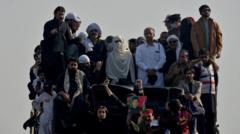Bushra Bibi, the wife of former Pakistan Prime Minister Imran Khan, led a large protest demanding her husband's release, only to vanish in the chaos that ensued. Eyewitness accounts reveal a tumultuous evening filled with violence, tear gas, and confusion, leaving many to question her role in politics and what lies ahead for her party.
The Rise and Fall of Bushra Bibi: A Protest Born of Love in Pakistan

The Rise and Fall of Bushra Bibi: A Protest Born of Love in Pakistan
Amidst the chaos and violence of a protest to free her husband, Imran Khan, Bushra Bibi’s mysterious disappearance raises questions about her political future and commitment to the cause.
With her husband imprisoned, Bushra Bibi had emerged at the forefront of a massive protest in Pakistan’s capital, Islamabad, calling for Imran Khan’s release.
Surrounded by fervent supporters, dressed in a white shawl and veil, Bibi encouraged the crowd, saying, “You have to stand with me” – an impassioned plea that marked her debut in the political arena. Behind her, the remnants of the protest left an alarming scene: a burnt lorry, scattered posters of Khan, and the air thick with the aftermath of tear gas.
The protest started with hope but turned chaotic. Witnesses reported that just as strong emotions filled the square of D Chowk, the lights went out, shrouding the gathering in darkness. Eyewitness Samia recounted the panic, detailing how she tended to her husband, who had been wounded with a gunshot. Amidst the mayhem, police began firing tear gas, and the protesters, once unified, fled in disarray.
With Imran Khan imprisoned on controversial charges, Bushra Bibi’s call to action had galvanized thousands. However, as the sun set, her presence quickly dissolved; videos showed her leaving the chaotic scene in a different vehicle. The aftermath saw at least five people confirmed dead and hundreds arrested.
The criticism of her withdrawal was swift—some supporters labeled her an "abandoner," while others defended her as someone caught between leadership and personal safety. Analysts debated whether her significant appearance signaled an entrance into a political landscape previously dominated by her husband or if she merely aimed to maintain a lifeline for the Pakistan Tehreek-e-Insaf (PTI) party.
Expectations of her role have shifted dramatically; once seen as a spiritual figure and sideline advisor, many believe Bushra Bibi is now in a crucial position to influence PTI during Imran Khan's absence. Yet, questions linger about her intentions and whether her actions signified a genuine commitment to her husband’s cause or a strategic maneuver in the tumult of Pakistani politics.
As the dust settles on the protest, and amidst unyielding conflict, Bushra Bibi remains a figure of intrigue—a witness to her husband’s political saga while grappling with her own identity as a potential leader in waiting.
Surrounded by fervent supporters, dressed in a white shawl and veil, Bibi encouraged the crowd, saying, “You have to stand with me” – an impassioned plea that marked her debut in the political arena. Behind her, the remnants of the protest left an alarming scene: a burnt lorry, scattered posters of Khan, and the air thick with the aftermath of tear gas.
The protest started with hope but turned chaotic. Witnesses reported that just as strong emotions filled the square of D Chowk, the lights went out, shrouding the gathering in darkness. Eyewitness Samia recounted the panic, detailing how she tended to her husband, who had been wounded with a gunshot. Amidst the mayhem, police began firing tear gas, and the protesters, once unified, fled in disarray.
With Imran Khan imprisoned on controversial charges, Bushra Bibi’s call to action had galvanized thousands. However, as the sun set, her presence quickly dissolved; videos showed her leaving the chaotic scene in a different vehicle. The aftermath saw at least five people confirmed dead and hundreds arrested.
The criticism of her withdrawal was swift—some supporters labeled her an "abandoner," while others defended her as someone caught between leadership and personal safety. Analysts debated whether her significant appearance signaled an entrance into a political landscape previously dominated by her husband or if she merely aimed to maintain a lifeline for the Pakistan Tehreek-e-Insaf (PTI) party.
Expectations of her role have shifted dramatically; once seen as a spiritual figure and sideline advisor, many believe Bushra Bibi is now in a crucial position to influence PTI during Imran Khan's absence. Yet, questions linger about her intentions and whether her actions signified a genuine commitment to her husband’s cause or a strategic maneuver in the tumult of Pakistani politics.
As the dust settles on the protest, and amidst unyielding conflict, Bushra Bibi remains a figure of intrigue—a witness to her husband’s political saga while grappling with her own identity as a potential leader in waiting.


















